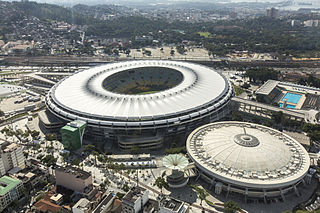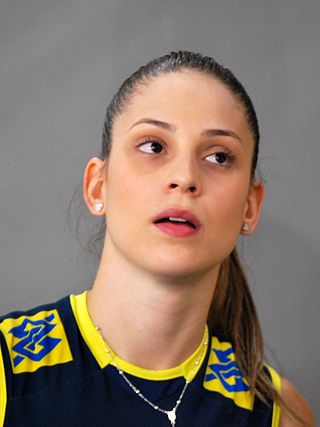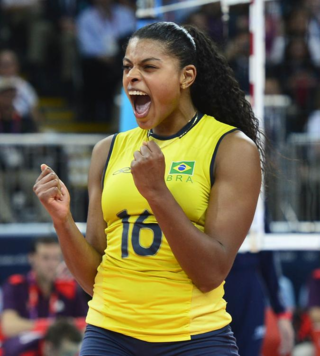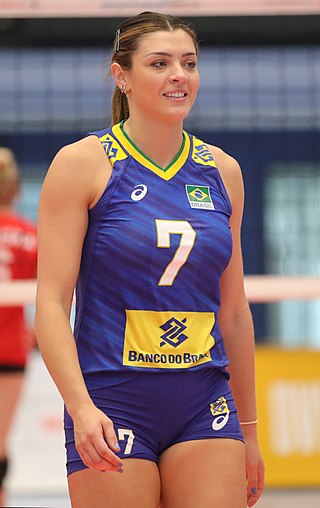
Sports in Brazil are those that are widely practiced and popular in the country, as well as others which originated there or have some cultural significance. Brazilians are heavily involved in sports. Football is the most popular sport in Brazil. Other than football, sports like volleyball, mixed martial arts, basketball, tennis, and motor sports, especially Formula One, enjoy high levels of popularity.
The FIBA Women's Basketball World Cup, also known as the Basketball World Cup for Women or simply the FIBA Women's World Cup, is an international basketball tournament for women's national teams held quadrennially. It was created by the International Basketball Federation (FIBA). Its inaugural game was in 1953 in Chile, three years after the first men's World Championship. For most of its early history, it was not held in the same year as the men's championship, and was not granted a consistent quadrennial cycle until 1967. After the 1983 event, FIBA changed the scheduling so that the women's tournament would be held in even-numbered non-Olympic years, a change that had come to the men's tournament in 1970.

The Brazil men's national volleyball team is governed by the Confederação Brasileira de Voleibol(Brazilian Volleyball Confederation) and takes part in international volleyball competitions. Brazil has won three gold medals at the Olympic Games, has won the World Championship three times, and the World League nine times. Brazil is the national volleyball team that has won the most titles overall, and also the team that has won most titles outside their regional competition. The team is sometimes referred to as volleyball's "Dream Team" specially in reference to its winning streak period under coach Bernardo Rezende. Currently Brazil is ranked seventh on the FIVB World Rankings.

Stacy Denise Sykora is an American retired volleyball player. She was a two-time All-American at Texas A&M University and she competed in both the 2000 and the 2004 Olympics as part of the U.S. women's national team. She made her third Olympic appearance at the 2008 Olympics, helping Team USA to a silver medal.

The Chile men's national volleyball team represents Chile in international volleyball competitions and friendly matches.
The South American Under-20 Women's Football Championship, officially the CONMEBOL Sub20 Femenina, is an international association football competition for women's national teams. It is held every two years for South American players under the age of 20 and serves as a qualification tournament for the FIFA U-20 Women's World Cup. In its inaugural year, 2004, it was played by U-19 players.
Elisângela Almeida de Oliveira is a Brazilian former volleyball player.

Beach volleyball was introduced at the Summer Olympic Games in the 1992 Games as a demonstration event, and has been an official Olympic sport since 1996.

Association football is the most popular sport in almost all South American countries. There are a wide range of sports played in the continent of South America. Popular sports include rugby union, baseball, basketball, tennis, golf, volleyball, hockey, beach volleyball, motorsports and cricket. South America held its first Olympic Games in Rio de Janeiro, Brazil in 2016. Two years prior to this, major cities in Brazil hosted the 2014 FIFA World Cup.

Fabiana "Fabi" Alvim de Oliveira is a Brazilian retired volleyball player who won the gold medal at the 2008 and 2012 Summer Olympics.
Football is the most popular sport in Chile. The country's history of association football began with English sailors and their boat trips due to various commercial links between Chile and Great Britain in the 19th century.

Sports in Chile are performed at both amateur and professional levels, practiced both at home and abroad to develop and improve, or simply represent the country. Association football is the most popular sport in Chile, and is played for a range of reasons. However, the country's most successful sport is tennis. In rural areas, Chilean rodeo is the most practiced sport in Chile, which is the national sport. Chile has achieved great international success in other sports, and there have been important figures, however, such exploits are not known to the general population because they are not sports that have been popular throughout the country.

Camila de Paula Brait is a Brazilian volleyball player from Frutal, Brazil, who plays as a libero. She currently defends Osasco Voleibol Clube and is retired from the Brazilian national team.

Fernanda Garay Rodrigues is a Brazilian retired professional volleyball player who won the 2012 Summer Olympics gold medal and the silver medal at 2020 Tokyo Summer Olympics with the Brazilian national team. She is 1.79 m tall. She played with Praia Clube.

Chile competed at the 2016 Summer Olympics in Rio de Janeiro, Brazil, from 5 to 21 August 2016.
The 2015 Women's South American Volleyball Championship was the 31st edition of the Women's South American Volleyball Championship held in Cartagena, Colombia and organised by South America's governing volleyball body, the Confederación Sudamericana de Voleibol (CSV). Brazil won its 19th title with Gabriela Guimarães being elected Most Valuable Player.
The FIVB Men's Volleyball World Championship is an international volleyball competition contested by the senior men's national teams of the members of Fédération Internationale de Volleyball (FIVB), the sport's global governing body. The initial gap between championships was variable, but since 1962, they were held every four years. The tournament will be held biennially starting in 2025.
The FIVB Women's Volleyball World Championship is an international volleyball competition contested by the senior women's national teams of the members of Fédération Internationale de Volleyball (FIVB), the sport's global governing body. The initial gap between championships was variable, but since 1970 they have been awarded every four years. The tournament will be held biennially starting in 2025.
Camila Gómez is a Colombian volleyball player for the Grand Rapids Rise of the Pro Volleyball Federation and the Colombia women's national volleyball team.

Rosamaria Montibeller is a Brazilian volleyball player. She usually plays as an opposite spiker and occasionally as a wing spiker. A part of Brazil women's national volleyball team ever since winning silver at the 2015 Pan American Games in Toronto, she has since won two medals in the Olympic Games, silver in Tokyo 2020 and bronze in Paris 2024.












